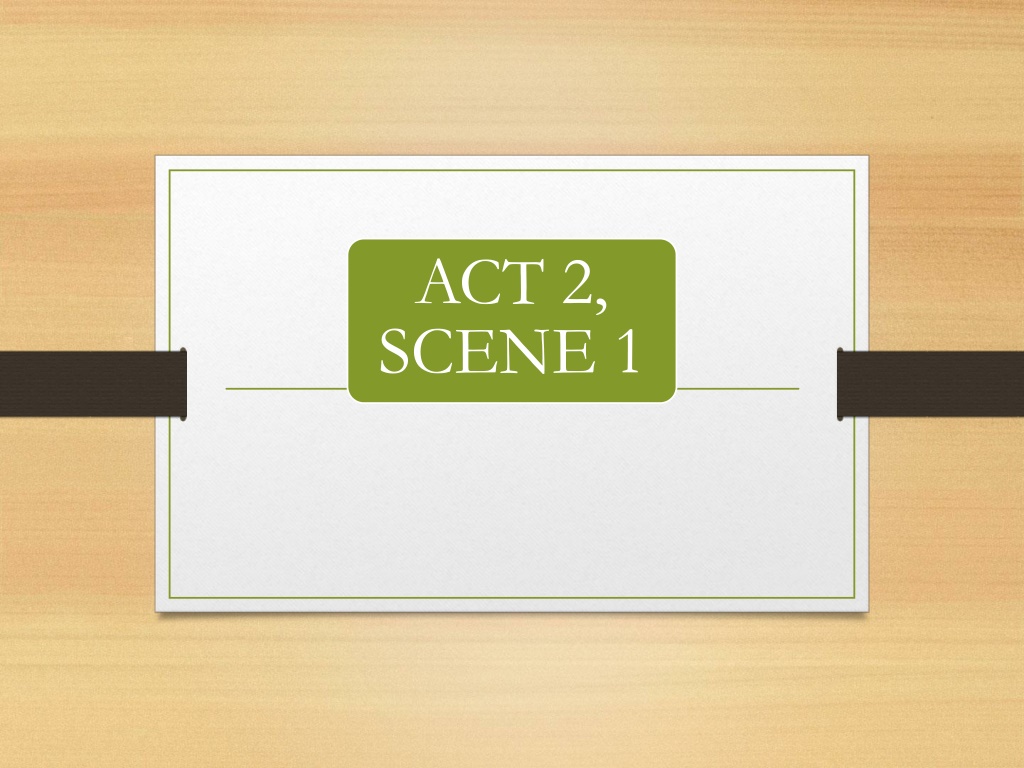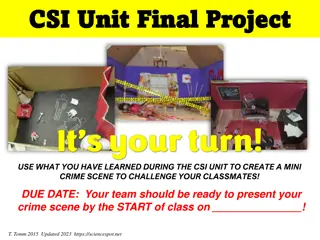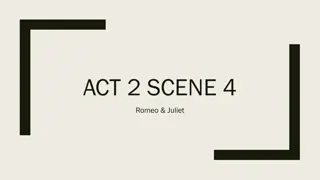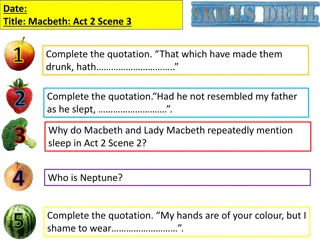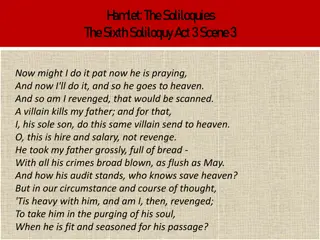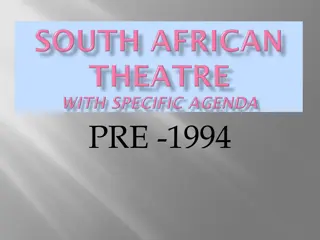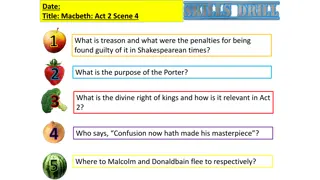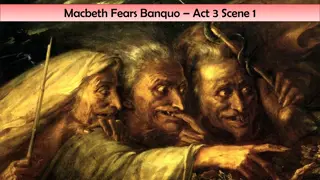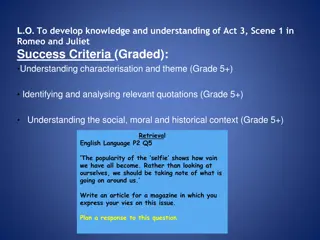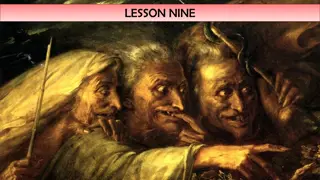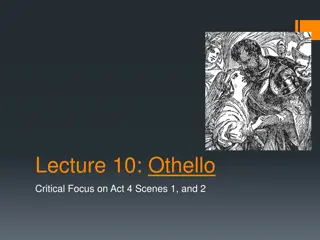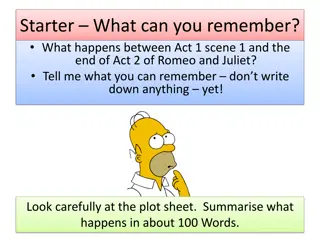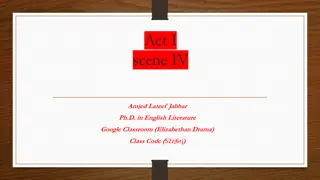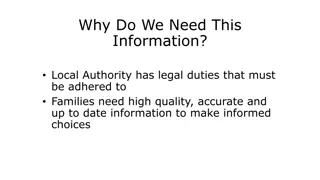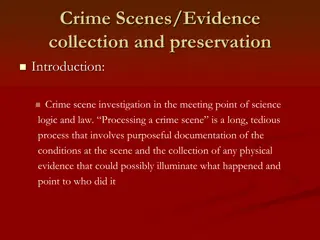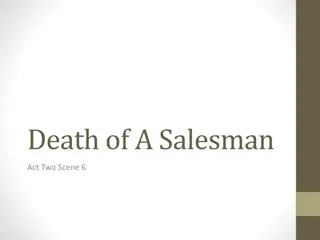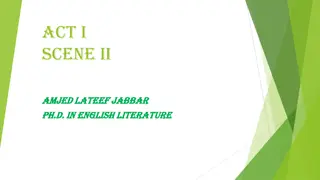Exploring Changes and Choices in 'My Children, My Africa' - Act 2, Scene 1
In Act 2, Scene 1 of "My Children, My Africa," Thami withdraws from a debating competition due to planned school boycotts. Isabel undergoes a transformation, becoming more aware of discrimination and seeking understanding of other cultures. Thami's decision to align with the Comrades and avoid contact with white people leads to conflicts and self-discovery among the characters.
Download Presentation

Please find below an Image/Link to download the presentation.
The content on the website is provided AS IS for your information and personal use only. It may not be sold, licensed, or shared on other websites without obtaining consent from the author. Download presentation by click this link. If you encounter any issues during the download, it is possible that the publisher has removed the file from their server.
E N D
Presentation Transcript
ACT 2, SCENE 1
MY CHILDREN, MY AFRICA ENGLISH FIRST ADDITIONAL LANGUAGE P2 EXAM PAPER LAYOUT
Brief outline : Act 2, Scene 1 Thami withdraws from the debating competition because of the planned school boycott. He however, did not informed Mr M of his decision yet. Isabel questions Thami about the kind of freedom he wants to fight for. Mr M asks Thami to explain his decision to be involved with the Comrades. Thami explains: Comrades want to avoid any contact with white people. Mr M explains that he has always opposed Bantu Education policies. Mr M reiterates the effectiveness of words in any struggle. Thami informs Mr M that he has been labelled an informant for the apartheid government and is therefore considered a spy.
Isabel notices changes and developments Isabel: Been a strange time these past few weeks, hasn t it? At home, at school, in the shop ... everywhere! Things I ve been seeing and doing my whole life, just don t feel right anymore. Isabel is awaking from her naivety and the ignorant effects that the apartheid system caused over the years. She senses that things are not what they seem to be and she realises that something major is about to happen. Her interaction with Thami and Mr M changes and transforms her as a person as well as her perception of other cultures and apartheid system. She becomes more sympathetic and is eagerly seeking for more.
Changes within Isabel Isabel also notices the changes that occur within herself. Example: She says that her conversation with Samuel (their delivery boy) felt so false and forced I thought I was talking to a ten-year-old . Isabel admits to Thami that she is changing. Previously her conversations with black people were naively and innocently prejudiced - she would talk down to them but now she feels uncomfortable when she speaks to Sam or their Maid (Aunty) because now she is more aware of the discrimination and inequalities that exists between them.
Thami withdraws from the debating competition Isabel sensed that Thami was going to withdraw from the debating competition. Isabel says to Thami: I ve had a feeling that something was going to go wrong somewhere. She noticed that Thami s mood was very tense. He was very frustrated. He did not pay any attention to Isabel when she was speaking to him.
Why did Thami withdraw from the competition? Two reasons: - His involvement with the Comrades. - The planned stay-away and school boycott campaign which meant no/minimal contact with white people.
Thami and Isabel become frustrated and angry at each other. ISABEL: Don t be stupid, Thami! Of course I do! You d have to be pretty dumb not to know that the dreaded unrest has finally reached us as well. THAMI: Talk about what? Don t you know what is going on? Isabel: All right then, The Beginning. I don t care what it s called. All I m asking you to do in explain to me how the two of us learning some poetry, cramming in potted bios interferes with all that. THAMI: We don t call it that. Our word for it is Isiqalo ... The Beginning.
IsiqaloThe beginning Thami refers to the unrest as the Beginning. Beginning of the revolution (drastic change) through the struggle Beginning of political change in the country. Beginning of freedom and equality for all. 1.Isabel however realises that the situation in the township is like a bomb waiting to explode and that the existing peace will not last very long. 2.To her this beginning that Thami talks about , means the end of their friendship
Thamis fight for freedom vs freedom of association ISABEL: ISABEL: And they are going to decide whether we can or can t be friends? Man Thami, this great Beginning of yours sounds like I don t know. Other people deciding who can and who can t be your friends, what you must do and what you can t do. Is this the freedom you ve been talking to me about? That you were going to fight for? THAMI: I was right. You don t understand what s going on.
Contradiction Thami is clearly contradicting himself. He is fighting for liberation, total freedom and equality for all. YET He is allowing the comrades to dictate to him who he can /cannot be friends with or associate with. Isabel wants to know: WHERE S THE FREEDOM IN THAT???
Tension between Mr M and Thami MR M: Oh Thami ... you learn your lessons so well! The Revolution has only just begun and you are already word perfect. So then tell me, do you think I agree with this inferior Bantu Education that is being forced on you? THAMI: You teach it.
THAMI ACCUSES MR M OF AGREEING WITH BANTU EDUCATION Mr M is clearly extremely disappointed in Thami (his favourite student) who accuses him of being a traitor. MR M s defence: MR M: I regarded it as my duty, my deepest obligation to you young men and women to sabotage it (inferior Bantu Education).
How did Mr M sabotage Bantu Education in his class? "Sabotage" means to challenge or undermine. 1.Mr M taught his learners to think for themselves and to think independently. He liberated their minds rather then enslaving them with just an inferior education. 2. irrefutable proof of my success = Thami is an extremely eloquent, highly intelligent and clever speaker. He is the ultimate proof of how successful Mr M s teaching skills and techniques were. Mr M has liberated Thami s mind extensively and has equipped him with the clever ability to play around with words and manipulate his comrades by using words.
SIGNIFICANCE OF THE OX What does Mr M mean? 1. Ox is a symbol of strength and stupidity. (cannot speak). 2. People have the ability to speak, it gives them power over animals who are strong, but unintelligent. 3. Language and speaking is more powerful than strength and violence. 4. Mr M feels that it is more effective to change the ideas and perceptions of people through words as opposed to violence. MR M: Tell them the difference between a man and an animal is that Man thinks, and he thinks with words. Consider the mighty ox
Important themes The themes of generation divide Thami and Mr M do not see eye to eye. Mr M believes that the struggle can only be conquered through words, deliberation and negotiations and that change will occur over a period of time. Thami is impatient and wants change to happen instantly and immediately, therefore he resorts to the belief of violence. theme negative effects of Apartheid brought division between black and white (Thami and Isabel) also brought division between black and black (Mr M and Thami). ******************************************
ACT 2, SCENE 2
ACT 2 SCENE 2 Mr M describes what happens when he tries to get to the school and finds his route to his school blocked by policemen, soldiers and Comrades building barricades. Mr M sees looting, burning and children running from armoured cars. Children dance with matches in their hands.
A boy from Mr M s grade 8 (standard 6) class writes a slogan on wall, Liberation first, then education but asks Mr M to check the spelling. IRONY! Learners in the back of a police van call Mr M for help. Children are stoning a police car. Police retaliate with tear-gas bombs.
QUOTES: and then I gave up and just wandered around aimlessly, helplessly, watching my world go mad and set itself on fire. Do something! Stop the madness! Liberation first, then education Is the spelling right, Mr M? IRONY
ACT 2, SCENE 3
BRIEF OUTLINE ACT 2,SCENE 3 Mr M is alone in Number One Classroom. He rings the school bell wildly. He takes roll call. Thami enters and orders Mr M to stop ringing the bell Mr M compares the dictionary to the stone. He gives the dictionary to Thami, but he refuses to take it. Thami informs Mr M that he was accused of being an informer. The Comrades are going to burn the school down. They want to kill Mr M. Mr M admits to providing the police with names. Mr M wants to end the violence and lawlessness. He is also jealous of the people who had taken Thami away from him. Mr M explains how the world is wasting his children, his Africa. Mr M goes outside, ringing the bell, and is killed.
SIGNIFICANCE OF NUMBER ONE CLASSROOM LITERAL MEANING: the actual number of the classroom. FIGURATIVE MEANING: The best academic group of learners. The A-class / the top achievers.
THE RINGING OF THE BELL Why did Athol Fugard start and end this scene with Mr M ringing the bell? Start of scene: Mr M rings the bell to call learners to school. He wants to protect them from danger and death as he knows that these riots and protests might lead to their death. End of the scene: Athol Fugard wants to show us that Mr M is not afraid to die. He does this by letting Mr M walk out of the Number One Classroom to confront the Comrades who then eventually kill him. Climax: despite Thami s desperate attempts to keep Mr M from confronting the Comrades, Mr M rebelliously walks straight into his death. This creates the dramatic climax in this scene and in the drama as a whole.
WORDS VS VIOLENCE MR M: No, you don t need me for lessons in stone-throwing either. You ve already got your teachers in those very revolutionary subjects, haven t you? if you put these two on a scale I think you would find that they weigh just about the same. But in this hand I am holding the whole English language [dictionary]. This [the stone] is just one word in that language.
WORDS VS VIOLENCE (analysis) SCALE: represents Justice DICTIONARY STONE - Represents violence / stupidity / unintelligence. -- one word. -- less powerful than the dictionary and it is weak because you only have one word and one action [stone-throwing]. - intelligence. - The whole English language. - Makes you more powerful and stronger because you have more words and actions to fight with. Represents words/knowledge /
TRUE / FALSE: MR M gave the police the names of learners who attended his school. FALSE. MR M: I did go to the police. I sat down in Captain Lategan s office and told him I felt it was my duty to report the presence in our community of strangers from the north. I told him I had reason to believe that they were behind the present unrest. I gave the Captain names and addresses. This statement by Mr M confirms that he was aware of what was happening in his community and he was concerned about the well-being of his children.
WHY DID MR M REPORT THESE STRANGERS FROM THE NORTH? Mr M felt it was his duty to report them. WHY??? These strangers did not reside in the township. They were intruders. They were from the North not from his community. They were brainwashing and manipulating his children. They were destroying his community, his children, his Africa and he needed to protect his children. Mr M wanted to put an end to the madness of boycotts, mob violence and lawlessness.
WHAT WAS THE MAIN REASON WHY MR M WENT TO THE POLICE? Mr M was missing Thami. Thami was like a son to him. He felt Thami had deserted him. He was jealous of the Comrades for taking Thami from him his brilliant prot g (most dedicated and bright student) He was angry at the Comrades for leaving him with an empty classroom for taking all his students. He was furious because the comrades have taken his life, his home, his only ambition to be a good teacher.
MR M: Every African soul is carrying the bundle, or in it. What is wrong with this world that it wants to waste you all like that my children my Africa! Here Mr M refers to the suffering of all Africans. They are suffering either because they are victims or they are carrying the victims. This could be true as many Africans suffer from the effects of disease, poverty, famine and war. BUT on the other hand not all Africans are victims. Also, people who believe they are victims, are taking their own power away from them become disempowered. *******************************
ACT 2, SCENE 4 & 5
ACT 2 SCENE 4 and 5 Thami has asked Isabel to meet him so that he can say goodbye. Isabel is tense, angry / upset and questions why he wants to say goodbye. She says Thamialready said farewell three weeks ago when he ended their friendship. ISABEL S HUMILIATION?
Isabel says that she thought the reason Thami wanted to meet with her was to talk about the death of Mr M. She takes out the crumpled newspaper article that reported Mr M s death, indicating that she carries it with her all the time? Isabel wants to know why such a good, devoted man was killed.
Thami tells her that Mr M had given the names of the action committee members to the police and that these leaders had all been arrested and detained, making him an informer. Isabel does not believe that Mr M was a police spy. Thami tells her that Mr M told him he had gone to the police because he thought it would help stop the violence.
Thami and Isabel argue about whether it is fair to call Mr M an informer. Isabel insists on calling Mr M s death a murder. Thami feels the people who killed Mr M did it in self- defence. Isabel reluctantly asks if Thami was present when Mr M was killed and if so did he try to save Mr M s life.
Thami admits he was present and that he had tried to save Mr M. Isabel and Thami both admit that they had loved Mr M. Thami tells Isabel of his plans to go into exile and join the movement as a fighter. Thami tells Isabel she can be near to the spirit of Mr M at the top of the Wapadsberg Pass.
In Scene 5 Isabel comes to pay her last respects to Mr M, promising that she will dedicate herself to making her life really useful. She wants him to be proud of her as one of his children. Her final words are The future is still ours, Mr M.
QUOTESScene 4: He said he felt it was his duty. There is no justice for black people in this country other than what we make for ourselves. When you judge us for what happened in front of the school four days ago just remember that you carry a share of the responsibility for it. It is your laws that have made simple, black people so desperate that they turn into mad mobs .
I also loved him, doesn t help much to say it now, but I did. You know the two most terrible words in your language, Isabel? Too late. Scene 5: instead I ve brought you something which I know will mean more to you than flowers or prayers ever could. A promise.
My promise to you is that I am going to try a hard as I can, in every way that I can, to see it doesn t happen to me. [she promises not to waste her life] I want you to be proud of me. After all, I am one of your children, you know. NB: The future is still ours, Mr M.
CONCLUSION IMPORTANT THEMES: Words vs violence Order vs chaos CHARACTERS ROUND AND FLAT MR M: Thami and Isabel: they grew and developed in the play. Thami initially liked school, in the end he hated school. Isabel used to be prejudice and spoke down to blacks, later she considered blacks as her equal. - his character remains the same throughout the play. He is a traditionalist. He is old-fashioned. Has teacher-centered approach. Believes teacher teaches, learners learn and follow instructions. - - - - - - -
